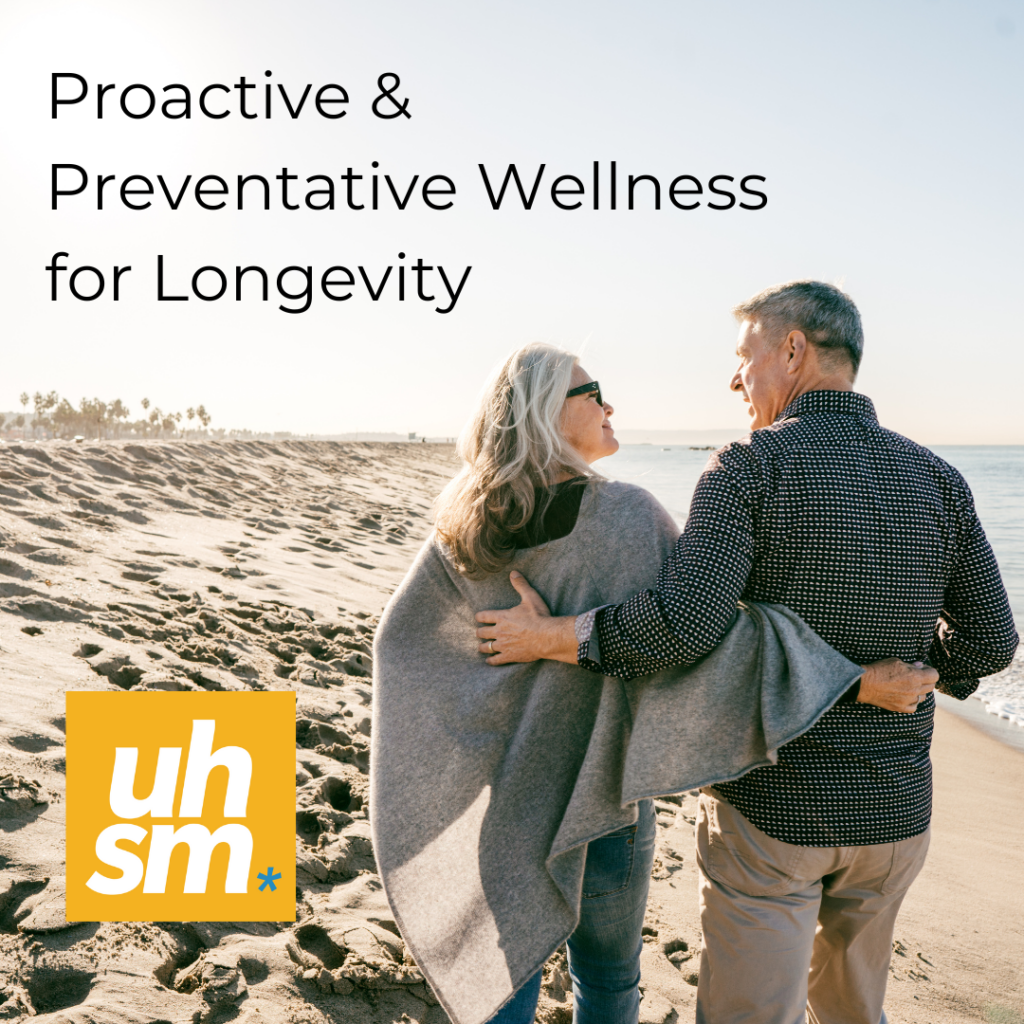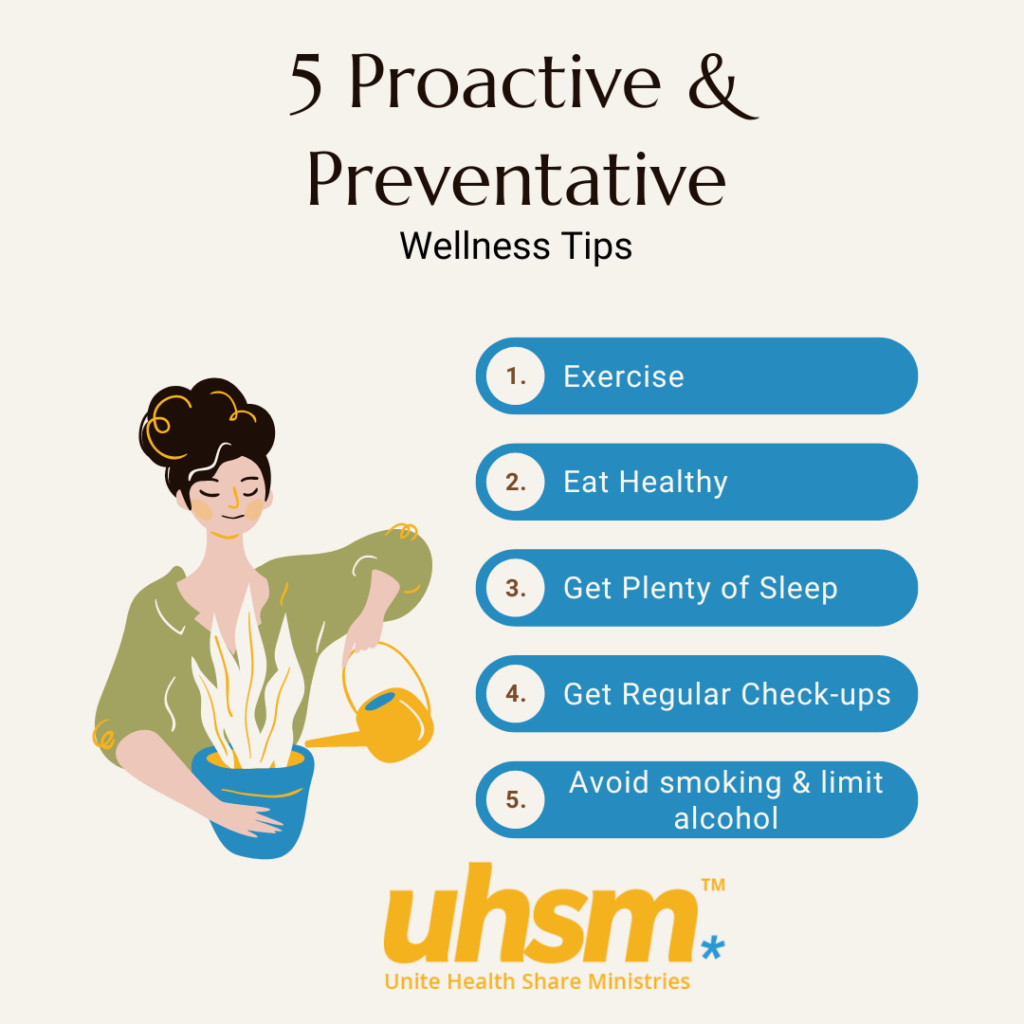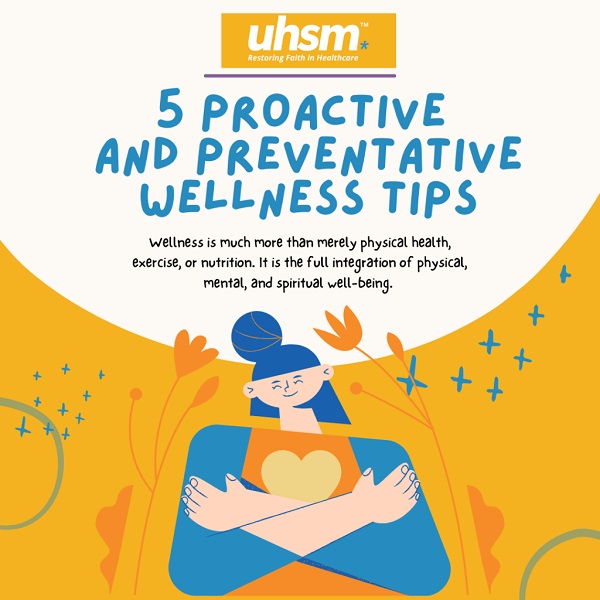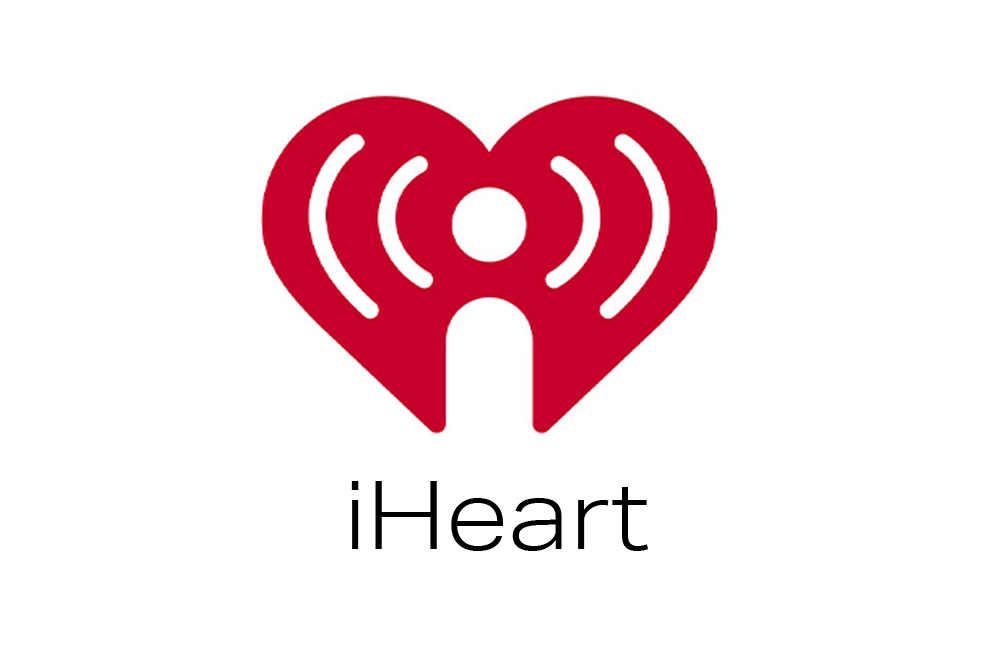September is National Disease Literacy Month, a campaign aimed at raising awareness and educating people about preventative health care and wellness. As part of this campaign, UHSM will share weekly tips and tricks for proactive and preventative approaches to health and wellness.
Disease literacy month was founded to educate people about their conditions and the associated services needed to make careful decisions so that they can live a healthier life. The purpose of the educational campaign is to improve a person’s overall understanding of their diagnosis, as well as the associated services needed to make care decisions for oneself of one’s family.
In this post, we’ll discuss how to take a proactive and preventative approach to health and wellness. By adopting small, actionable steps regularly, you can improve longevity and overall well-being. Preventative health care emphasizes early intervention and frequent communication with your doctor to identify symptoms before they become severe or chronic.
“An ounce of prevention is worth a pound of cure.” – Benjamin Franklin
Proactive vs. Reactive Health Care
Understanding the difference between proactive and reactive health care is essential for embracing preventative health care:
- Reactive health care is only visiting your doctor or physician when symptoms or problems arise. For example, if you wake up with a cough, fever and body aches, and visit the doctor to get antibiotics, this is considered reactive healthcare. Both you and the doctor are reacting to the symptoms.
- Proactive or preventative health care is taking action before any symptoms arise. Instead of waiting for the symptoms of a cold or virus to manifest themselves, take a proactive approach by utilizing vitamins, supplements, and by drinking plenty of fluids as a great way to practice preventative care. Booking regular checkups with your doctor is another example of proactive wellness care.
The healthcare system was designed in the post-World-War II era as a “sick care” system. For the most part, the system was not set up to help prevent the onset of disease, but instead to diagnose and treat illness. This reactive approach to health care is both expensive and ineffective in meeting the needs of today’s healthcare population.
Today, health care is quickly experiencing a paradigm shift and transforming from a reactive to a proactive system and focusing on preventative health care methods as a way to improve health and wellness.
So, how can you take a more proactive and preventative approach to your health care? Here are some wellness tips to help you live happier and healthier:

5 Proactive and Preventative Wellness Tips
- Exercise: Regular exercise and physical activity can improve your health, boost your immune system and give you a longer life. Exercise helps to strengthen your mind and body and can improve energy and flexibility. Whether it’s a morning walk or taking a class at your local gym, it’s important to set aside some time to make exercise a habit.
- Eat Healthy: A healthy diet can help you maintain a healthy body weight and prevent diseases like heart problems and diabetes. Eating more fruits and vegetables, taking supplements and minerals help boost immunity and protect your body from infection. Replacing processed foods with whole foods, snacking on antioxidant rich foods and substituting red meat for lean protein are simple changes that have a big impact.
- Get plenty of sleep: Lack of sleep increases your chances of diseases and the risk of mental disorders like anxiety and depression. Sleep is vital for your body and mind to function optimally. It reduces stress and helps to restore your energy. It’s important to get at least 7 hours of sleep each day to make sure you are happy and healthy.
- Get regular check-ups, screenings and tests: Regular doctor visits, health screenings, and tests are vital for early disease detection and prevention. For example, screenings like mammograms and colonoscopies can detect cancer early, improving treatment outcomes. Share your family medical history with your doctor to tailor preventative health care to your needs.
- Avoid smoking and limit alcohol consumption: Smoking and high amounts of alcohol consumption have been linked to many health conditions such as cancer, heart disease and stroke. Be avoiding smoking and reducing the amount of alcohol consumed can help prevent these conditions.
By embracing these proactive habits, you can prevent disease and maintain your health for years to come.
Why Preventative Health Care Matters
Preventative health care focuses on staying ahead of potential health issues rather than waiting for symptoms to appear. By prioritizing your health today, you can enjoy a longer, healthier, and more fulfilling life.
“For while bodily training is of some value, godliness is of value in every way, as it holds promise for the present life and also for the life to come.” 1 Timothy 4:8

How UHSM Supports Proactive and Preventative Health Care
At Unite Health Share Ministries, our goal is to empower our community to take a proactive and preventative approach to their mind, body, and spiritual health. As a UHSM member, you gain access to:
- The PCHS® PPO Network and CVS Caremark™ Network: Connecting you to top providers and pharmacies across the nation.
- Noom Membership: Noom is a company dedicated to creating a healthier world. They are committed to helping their users achieve physical, mental, and emotional well-being.
- Fitbod Membership: Fitbod is an award-winning application that leverages AI to provide users with personalized workouts tailored to their goal, ability, and available equipment
- Pray.com Membership: Pray.com is the world’s #1 app for daily prayer and faith-based audio content. Experience stronger faith, deeper sleep, and a better prayer life when you download the Pray.com app.

Next Week: To continue with the theme of National Disease Literacy Month and promoting healthier and happier living, UHSM will be sharing more about Growing in the name of the Lord: Wellness from Spirit to Practice.
Incorporating preventative health care strategies into your lifestyle can transform your overall well-being. From exercise and nutrition to sleep and regular screenings, these habits lay the foundation for a healthier life. At UHSM, we’re here to support you on your journey to better health. Visit WeShare.org to learn more about how UHSM can help you embrace proactive and preventative health care.
Unlock proactive wellness strategies for a healthier lifestyle
Alive for Christ in Allen, TX: Fall Christian Life Coaching Conference
Honoring our Heroes and Celebrating Freedom: How Health Sharing Upholds American





